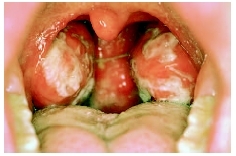Infectious mononucleosis

Definition
Infectious mononucleosis is a contagious illness caused by the Epstein-Barr virus that can affect the liver, lymph nodes, and oral cavity. While mononucleosis is not usually a serious disease, its primary symptoms of fatigue and lack of energy can linger for several months.
Description
Infectious mononucleosis, frequently called "mono" or the "kissing disease," is caused by the Epstein-Barr virus (EBV) found in saliva and mucus. The virus affects a type of white blood cell called the B lymphocyte, producing characteristic atypical lymphocytes that may be useful in the diagnosis of the disease.
The disease typically runs its course in four to six weeks in people with normally functioning immune systems. People with weakened or suppressed immune systems, such as AIDS patients or those who have had organ transplants, are particularly vulnerable to the potentially serious complications of infectious mononucleosis.
Demographics
While anyone, even young children, can develop mononucleosis, it occurs most often in young adults between the ages of 15 and 35 and is especially common in teenagers. The mononucleosis infection rate among college students who have not previously been exposed to EBV has been estimated to be about 15 percent. In younger children, the illness may not be recognized.
Causes and symptoms
The EBV that causes mononucleosis is related to a group of herpes viruses, including those that cause cold sores, chickenpox , and shingles. Most people are exposed to EBV at some point during their lives. Mononucleosis is most commonly spread by contact with virus-infected saliva through coughing, sneezing, kissing, or sharing drinking glasses or eating utensils.
In addition to general weakness and fatigue, symptoms of mononucleosis may include any or all of the following:
- sore throat and/or swollen tonsils
- fever and chills
- nausea and vomiting , or decreased appetite
-
swollen lymph nodes in the neck and armpits
 Sore throat and swollen tonsils caused by infectious mononucleosis, frequently called mono or the kissing disease.(Photograph by Dr. P. Marazzi. Science Photo Library/Photo Researchers, Inc.)
Sore throat and swollen tonsils caused by infectious mononucleosis, frequently called mono or the kissing disease.(Photograph by Dr. P. Marazzi. Science Photo Library/Photo Researchers, Inc.) - headaches or joint pain
- enlarged spleen
- jaundice
- skin rash
Complications that can occur with mononucleosis include a temporarily enlarged spleen or inflamed liver. In rare instances, the spleen may rupture, producing sharp pain on the left side of the abdomen, a symptom that warrants immediate medical attention. Additional symptoms of a ruptured spleen include light-headedness, rapidly beating heart, and difficulty breathing. Other rare, but potentially life-threatening, complications may involve the heart or brain. The infection may also cause significant destruction of the body's red blood cells or platelets.
Symptoms do not usually appear until four to seven weeks after exposure to EBV. An infected person can be contagious during this incubation time period and for as many as five months after the disappearance of symptoms. Also, the virus will be excreted in the saliva intermittently for the rest of their lives, although the individual will experience no symptoms. Contrary to popular belief, the EBV is not highly contagious. As a result, individuals living in a household or college dormitory with someone who has mononucleosis have a very small risk of being infected unless they have direct contact with the person's saliva.
Diagnosis
If symptoms associated with a cold persist longer than two weeks, mononucleosis is a possibility; however, a variety of other conditions can produce similar symptoms. If mononucleosis is suspected, a physician will typically conduct a physical examination, including a "Monospot" antibody blood test that can indicate the presence of proteins or antibodies produced in response to infection with the EBV. These antibodies may not be detectable, however, until the second or third weeks of the illness. Occasionally, when this test is inconclusive, other blood tests may be conducted.
Treatment
The most effective treatment for infectious mononucleosis is rest and a gradual return to regular activities. Individuals with mild cases may not require bed rest but should limit their activities. Any strenuous activity, athletic endeavors, or heavy lifting should be avoided until the symptoms completely subside, since excessive activity may cause the spleen to rupture.
The sore throat and dehydration that usually accompany mononucleosis may be relieved by drinking water and fruit juices. Gargling salt water or taking throat lozenges may also relieve discomfort. In addition, taking over-the-counter medications, such as acetaminophen or ibuprofen, may relieve symptoms, but aspirin should be avoided because mononucleosis has been associated with Reye's syndrome , a serious illness aggravated by aspirin.
While antibiotics do not affect EBV, the sore throat accompanying mononucleosis can be complicated by a streptococcal infection, which can be treated with antibiotics. Cortisone anti-inflammatory medications are also occasionally prescribed for the treatment of severely swollen tonsils or throat tissues.
Prognosis
While the severity and length of illness varies, most people diagnosed with mononucleosis are able to return to their normal daily routines within two to three weeks, particularly if they rest during this time period. It may take two to three months before a person's usual energy levels return. One of the most common problems in treating mononucleosis, particularly in teenagers, is that people return to their usual activities too quickly and then experience a relapse of symptoms. Once the disease has completely run its course, the person cannot be reinfected.
Prevention
Although there is no way to avoid becoming infected with EBV, paying general attention to good hygiene and avoiding sharing beverage glasses or having close contact with people who have mononucleosis or cold symptoms can help prevent infection.
Parental concerns
The main concern for parents of children with mononucleosis is to keep the child resting until he or she fully recovers from the illness. Parents should also be aware of the symptoms of more serious complications of the liver and spleen, and should seek medical attention for a child who complains of severe abdominal pain, light-headedness, rapid heartbeat, or difficulty breathing.
KEY TERMS
Antibody —A special protein made by the body's immune system as a defense against foreign material (bacteria, viruses, etc.) that enters the body. It is uniquely designed to attack and neutralize the specific antigen that triggered the immune response.
Herpes virus —A family of viruses including herpes simplex types 1 and 2, and herpes zoster (also called varicella zoster). Herpes viruses cause several infections, all characterized by blisters and ulcers, including chickenpox, shingles, genital herpes, and cold sores or fever blisters.
Reye's syndrome —A serious, life-threatening illness in children, usually developing after a bout of flu or chickenpox, and often associated with the use of aspirin. Symptoms include uncontrollable vomiting, often with lethargy, memory loss, disorientation, or delirium. Swelling of the brain may cause seizures, coma, and in severe cases, death.
Resources
BOOKS
Jensen, Hal B. "Epstein-Barr Virus." In Nelson Textbook of Pediatrics. Edited by Richard E. Behrman et al. Philadelphia: Saunders, 2004.
Katz, Ben Z. "Epstein-Barr Virus (Mononucleosis and Lymphoproliferative Disorders)." In Principles and Practice of Pediatric Infectious Diseases , 2nd ed. Edited by Sarah S. Long et al. St. Louis, MO: Elsevier, 2003.
PERIODICALS
Auwaerter, P. G. "Infectious mononucleosis: return to play." Medical Clinics of North America 23 (July 2004): 485–97.
ORGANIZATIONS
National Institute of Allergy and Infectious Disease. Building 31, Room 7A-50, 31 Center Drive MSC 2520, Bethesda, MD 20892–2520. Web site: http://www.niaid.nih.gov/default.htm.
Susan J. Montgomery Rosalyn Carson-DeWitt, MD